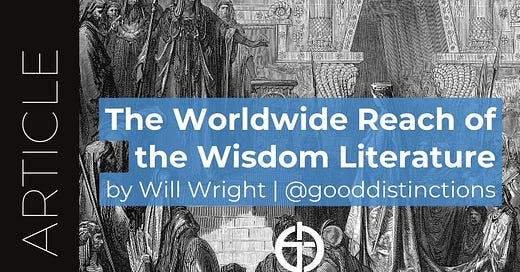There is a practice of Lectio Divina made popular by St. Ignatius of Loyola in which we seek to place ourselves into the scene of the Gospels. We visualize our surroundings and activate the rest of our senses to really try to be present in the passages of Sacred Scripture. We might hear that Jesus and His disciples are at the Sea of Galilee, but if we have not been to the Holy Land or seen pictures, it can be difficult to imagine ourselves in the scene. Every now and then in Sacred Scripture, though, a picture is painted for us that requires little to imagine.
For example, we read this in 1 Kings Chapter 10:
“1 Now when the queen of Sheba heard of the fame of Solomon concerning the name of the Lord, she came to test him with hard questions. 2 She came to Jerusalem with a very great retinue, with camels bearing spices and very much gold and precious stones. And when she came to Solomon, she told him all that was on her mind. 3 And Solomon answered all her questions; there was nothing hidden from the king that he could not explain to her. 4 And when the queen of
Sheba had seen all the wisdom of Solomon, the house that he had built, 5 the food of his table, the seating of his officials, and the attendance of his servants, their clothing, his cupbearers, and his burnt offerings that he offered at the house of the Lord, there was no more breath in her.” (1 Kings 10:1 - 5)
What a picture! We do not have to work hard to imagine the Queen of Sheba coming into Jerusalem to see King Solomon. She brought with her a whole retinue. My mind immediately goes to the scene from Disney’s Aladdin where the titular character enters into Agrabah as Prince Ali. Camels with sacks of spices on each side and bins filled with gold and precious stones. Certainly, the Queen herself was arrayed in the finest linens, gold, and jewels. She, with all her riches, came a long distance with all of these gifts and companions to see King Solomon. But why?! Sacred Scripture tells us that she came because the wisdom of Solomon made him famous throughout the known world.
David was known by the tribes surrounding Israel because of his slaying of Goliath and subsequent militaristic victories. But his son Solomon had become known across vast spans of the earth for his wisdom. What a gift! He received this gift because he asked for it from God rather than long life or death to his enemies - things other rulers may have asked for. Solomon was also the king who actually accomplished David’s dream of building a great Temple for the Lord in Jerusalem. He was wise, wealthy, and powerful.
What is incredibly significant, beyond the man, is the universality of the Wisdom Literature that we find in the Bible. The enfleshment of Wisdom itself is Jesus Christ. But preceding the Incarnation, the enfleshment, so to speak, of wisdom was the writings of David and Solomon. These texts are Proverbs, Job, the wisdom Psalms, Ecclesiastes, Song of Songs, the Wisdom of Solomon, and Sirach. Fun fact: the book of Sirach is quoted by Jesus Himself more than any other Old Testament book (sadly, it was removed from the Protestant Bibles).
What is it about this literature that sets it apart from the other Old Testament texts? Truly, the texts of the Wisdom Literature are universal - it engages the themes, strategies, and grammatical structures of much of the greatest literature of the time. There is a Greek flavor to much of these Jewish writings. The thought of the Hellenists informed the people of Judea and vice versa. This dialogue - such as the exchange between the Queen of Sheba and King Solomon - shows the power of the monotheistic and true religion of the People of God. Salvation is from the Jews and the Jewish Wisdom literature shows the stepping stone of preparation for the Messiah. God was preparing the world - through these seeds of the Word - for the coming of the Savior. Jesus came to save the Jews and the Gentiles alike.
God’s way of gradually and slowly revealing Himself is so merciful and glorious. He knows us. He knows we learn best in a gradual and progressive way. It, thus, makes sense that He would prepare the world for the coming of His Son in such a measured and fantastic way!




